Phoebe Wall Howard and Jamie L. LaReau, Detroit Free Press
Mon, October 2, 2023
When walking the UAW picket line, on any given day at any location, autoworkers say their sacrifices in the past informed 2023 contract discussions with the Detroit Three automakers.
These UAW members say auto executives have seen a surge in benefit packages more recently, and it's time they share more with workers who build the vehicles.
A strike entering its third full week currently involves some 25,000 workers or about 17% of Detroit Three UAW members on picket lines outside factories and parts warehouses nationwide, and that doesn't include the collateral damage of closures triggered by a supply chain ripple effect.
The sacrifices autoworkers are referring to are benefits they gave up in 2007-09 during the Great Recession, a time of historic economic struggle and even bankruptcy at General Motors and Chrysler (now owned by Stellantis).
According to a list created by the UAW and obtained by the Detroit Free Press, major concessions in the 2007 collective bargaining agreement to slash overall company costs included:
Creation of a new wage and benefit structure for entry level "tiered" wages.
Reducing start rate of $14.20 and top rate of $15.34 for new “non-core” workers, with the top production rate for existing workers at the time at approximately $28.
Replacing traditional pension and retiree medical insurance with a 401(k) program.
Providing less comprehensive medical, dental and vision insurance coverage.
Stopping general wage increases for traditional employees during the life of the contract, which started a pattern of no wage increases until 2015.

Major concessions continued in the 2009 collective bargaining agreement modifications included:
Suspending cost-of-living adjustments (COLA).
Suspending bonuses.
Suspending profit sharing.
Suspending Easter Monday holidays.
Discontinuing payment for unused vacation time.
Reducing break time.
Expanding use of temporary employees.
Allowing skilled trades workers to be used for production positions.
Eliminating the jobs bank.
Layoff protection (with SUB pay) reduced.
Implementing a no-strike clause (GM/Chrysler).
Retiree legacy costs were 'draining' balance sheets
In 2007, all three automakers created a Voluntary Employee Beneficial Association (VEBA) and eliminated the defined benefit plan (pension) for new hires. A VEBA is an independent trust that is financed by the companies and the union. It funds retiree health care.
Many UAW retirees work decades for automakers and retire prior to qualifying for Medicare.
The reason the companies had to end offering a pension and put a VEBA into effect to pay for the retiree health care was simple: “Their liability sheets were exploding,” said Marick Masters, professor at the Mike Ilitch School of Business at Wayne State University.
Masters said the liability for Ford’s pension was $44 billion and GM’s was $85 billion in 2007. He noted that a GM document in the 2007 contract shows that GM’s retiree health care liabilities for hourly workers totaled $46.7 billion.
“They knew their pensions were unfunded and they would have to make increasing annual payments to fund those pensions, which would drain their capital,” Masters said. “So you had billions of dollars eroding the working capital of the company.”
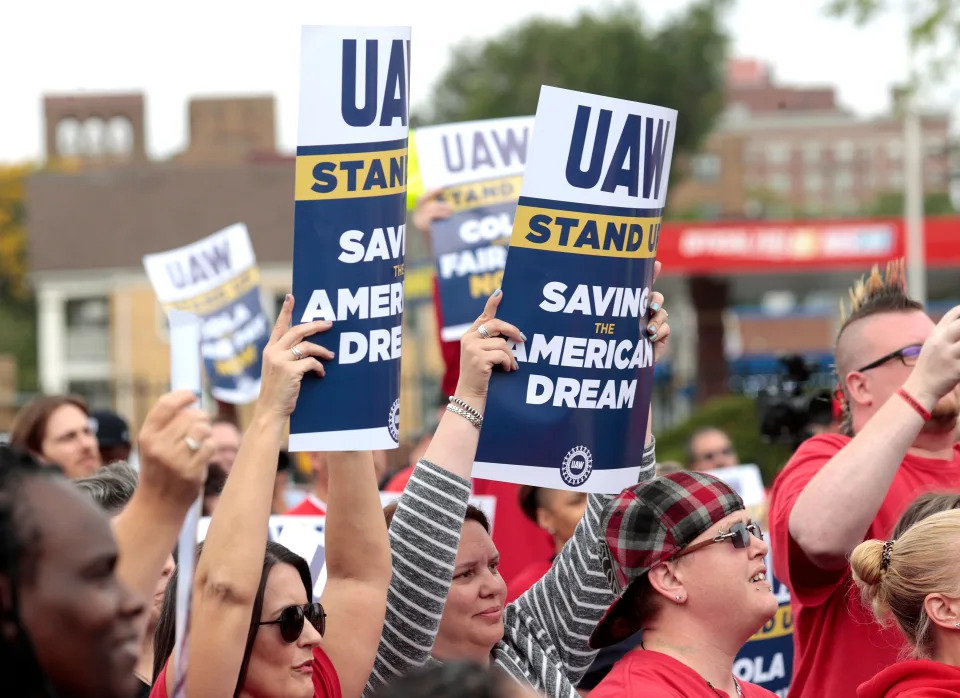
Today, none of the automakers would want to return to pensions or retiree health care obligations because it would “balloon their costs,” Masters said.
These so-called legacy costs are what startups such as Tesla and Rivian do not have, and analysts often point to as obligations that make newer competitors more of a financial threat to the Detroit Three.
“These things create lifetime liabilities and you don’t have enough active workers to defray those costs,” Masters said. “Everybody after 2007 has been in a defined contribution plan. It’s a huge amount of money to bring back pensions and retiree health care … all those things are what got them into trouble.”
Government assistance came with strings
The union agreed with the companies to eliminate retiree health care and defined benefit pension plans for new hires in their 2007 contracts, he said. To obtain government assistance before bankruptcy, the union and the companies had to agree to additional labor cost savings and massive corporate restructuring, which continued into bankruptcy.
In 2009, the parties also agreed to terminate cost of living allowances and the jobs bank.
"From the union's perspective, these concessions represented suspensions of hard-won benefits in prior negotiations, not necessarily permanent givebacks," Masters said. "But the companies, at least with respect to retiree health care and defined benefit plans, had no intention of reintroducing these benefits given the enormous drain on their balance sheets."
A defined benefit plan guarantees a specific payment every month, and all workers after 2007 have defined contribution plans.
"In fact, the union at the time agreed to not ever negotiate retiree health care benefits again," Masters said, citing the 2007 contract document from GM that says: "Agreement is permanent; UAW may not negotiate further future retiree health care benefits."
In addition, COLA was something that they banned with no restoration date, he said. "They ended up giving lump sum payments in lieu of general wage increases because that's what the economics at the time required. And they couldn't give profit sharing checks because the companies weren't making profits during those years."
Economics are different now, experts say
When UAW President Shawn Fain and his members on the strike line tell reporters they want restored what they gave up voluntarily, it fails to reveal the whole story, said Erik Gordon, a professor at the Ross School of Business at the University of Michigan.
"What really happened was a negotiated trade was made in return for plants staying open," he said.
At the time, GM had fired a significant number of executives and managers and said in its regulatory filings that it may be unable to compete for top management talent, Gordon said. "A lot of people gave up a lot of stuff."
What makes sense today, separate and apart from the past, is that the UAW members do deserve pay increases because the automakers have a lot of cash and they're making big profits, Gordon said. But the economics are different now than they were a decade ago and some benefits, such as pensions, have changed forever.
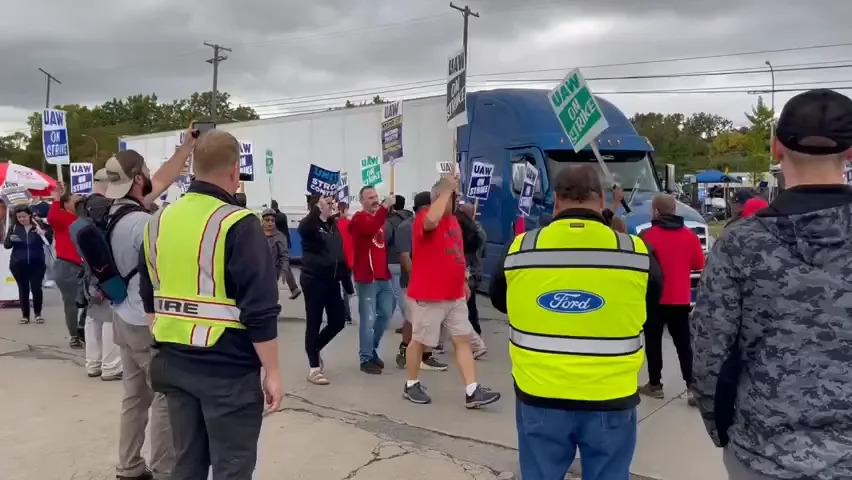
"What made sense at the time is not necessarily a continuation of what made sense then," Gordon said. "The industry faces different conditions and different risks. But I think it's a given that workers end up with substantial wage increases."
A factory worker's perspective
A UAW member who has worked in a Ford factory for more than two decade told the Free Press that the UAW is faced with negotiating on behalf of retired workers upset about negotiated losses, near-retired workers worried about negotiated losses and current manufacturing workers who feel they deserve more.
Still, most UAW workers understand there can't be a full restoration of past benefits, said the Ford worker, who asked not to be identified for fear of backlash from the union. The workers dismissed the idea of debating CEO compensation packages. "But the companies have made money and we deserve substantial raises."
This article originally appeared on Detroit Free Press
Opinion
UAW wants back concessions that saved automakers | Opinion
Ben Brady
Mon, October 2, 2023
Cincinnati.com | The Enquirer
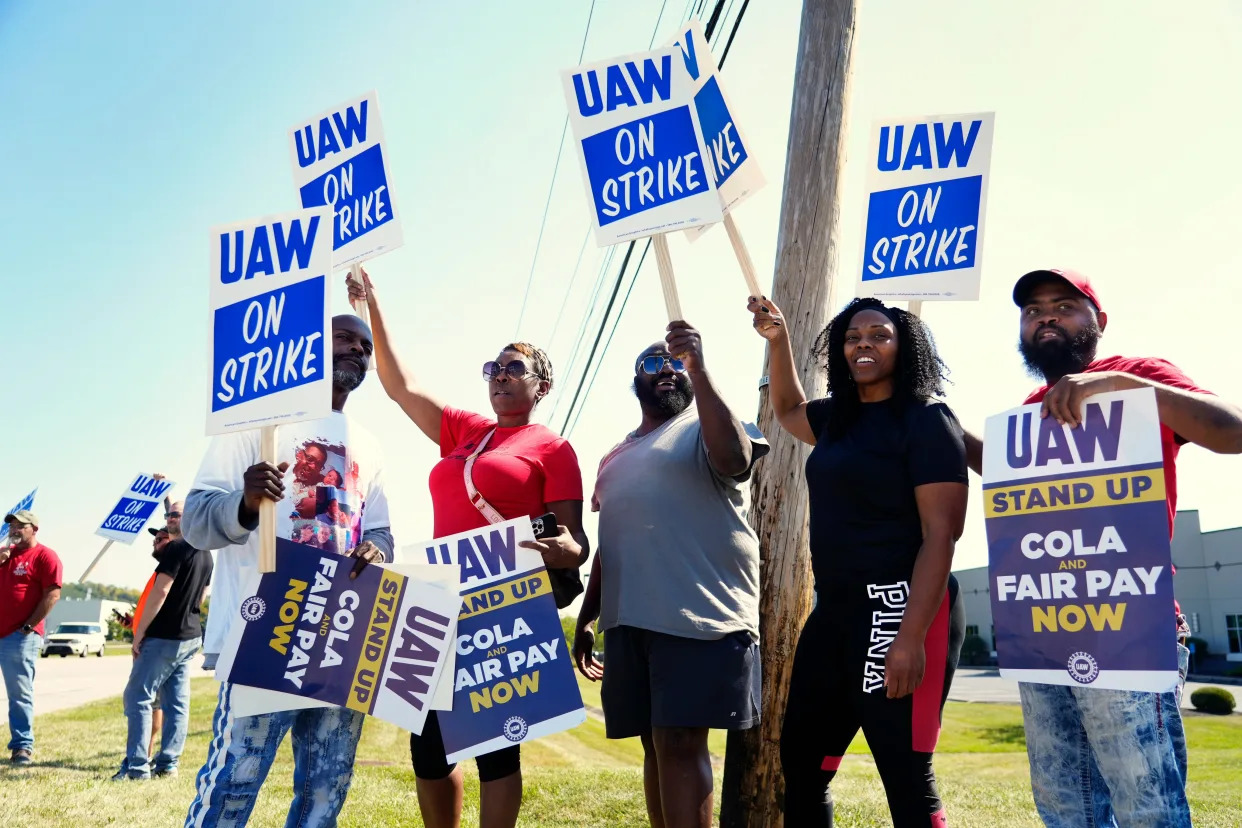
On Sept. 14 at 11:59 p.m., the 2019 contract between the UAW and Ford, GM and Stellantis (formerly Chrysler) expired and a new tentative contract agreement has not been reached. The International UAW called for a historic strategic, targeted strike on all three automakers, a first in the UAW’s 88-year history. As of Sept. 26, the UAW and Ford have made progress on contract negotiations, unfortunately GM and Stellantis have not, requiring additional UAW Locals to join the picket lines on Sept. 22, including UAW Local 674 in West Chester (GM Distribution).
I want to take a moment to provide some clarity to the general public on how important the negotiations are between the UAW and Ford, GM and Stellantis, as what we bargain for in our contracts, have direct and indirect consequences for the autoworkers, working men and women in the small businesses in the communities where we work and live, and our local, state and federal government budgets.
In 2009, the Big 3 − Ford, GM and Chrysler − were on the ropes, and while Ford did not require a government bailout, GM and Chrysler each took a bailout from the federal government. But for each company to survive long-term, UAW members made steep concessions in pay, gave up cost of living inflation pay, loss of benefits, loss of pensions for anyone hired after 2009 and other quality of life issues such as scheduled shift hours, overtime requirements and the ability for each company to place a two-tier wage structure which required any new employees to start at roughly half the wages of the legacy employee with a longer term to make top-out pay.
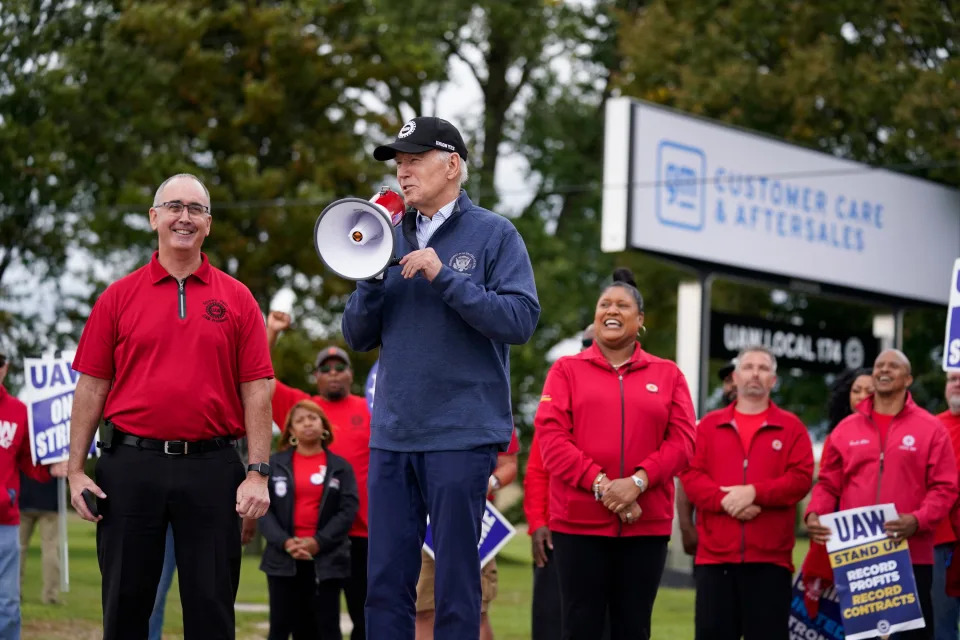
Since then, Ford, GM and Stellantis have made $164 billion in combined profits, $24 billion in the first six months of 2023 alone. The three CEOs of each company have also enjoyed a 40% to 70% wage increase, hefty stock options and the ability to have flex hours and the option to work from home. While the CEOs' quality of life has improved, UAW members in parts, production, powertrain and assembly plants have poured time and sweat into making the companies profitable with limited profit sharing and modest improvements in some workplaces. Unfortunately, UAW members have never fully recovered the concessions made since the 2009 contracts.
In a March 24, 2014 interview on CNBC "Squak Box," Bill Ford stated that the UAW (2009 concessions) saved Ford Motor Company. Because GM and Stellantis both were bailed out by the federal government through their bankruptcies, neither GM or Stellantis have ever recognized that the concessions also saved them as well. On August 31, 2023, the UAW filed a lawsuit against GM and Stellantis for failure to negotiate in good faith on the 2023 contract.
What are the UAW members demands for the 2023? To receive back many of the concessions that have made these companies billions. Those demands include a double digit pay raise, return of pensions and retiree health care for new hires, increases in vacation time and restorations of quality of life issues that have created hardships for families and communities across the nation, including the shuttering of plants in Lordstown, Ohio, Belvidere, Illinois and the closing of the Ford Batavia Transmission Plant in June of 2008 which impacted 800 jobs and left Clermont County looking for ways to make up the lost revenue for small businesses and the county budget.
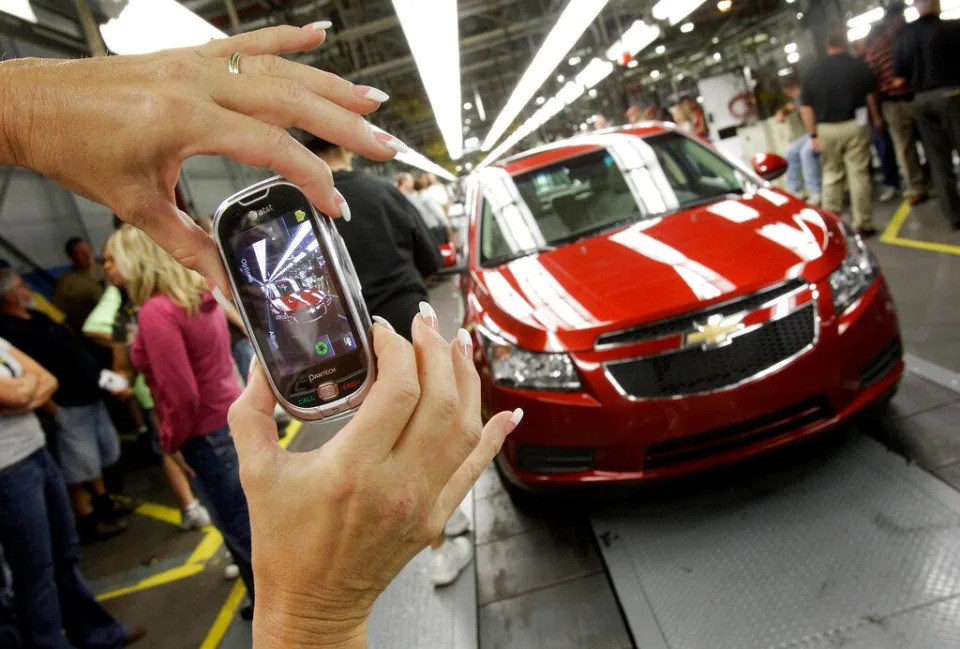
The communities where UAW members work and live, enjoy the security autoworkers jobs provide. Most of these auto plants are in rural communities where small businesses rely on the workers spending their money in the grocery, auto parts, car washes, hardware and medical care facilities. While it is estimated that six jobs in small parts plants are a direct result of one job at an automotive plant, 20 jobs are created in the community for each autoworker job. Their jobs include teachers, waiters, retailers and local EMT, police and firefighters, which also rely on the tax dollars that come from the autoworkers in the form of payroll, property and sales taxes. The quality of life issues UAW members win in contract negotiations also filter into the overall national workforce including the 40-hour work week, weekends off, company provided health insurance, overtime pay and retirement plans. Autoworkers also are often some of the most generous in our communities through donations to sports teams, school functions and holiday drives. They also participate in local events that support the communities.
UAW members have a long history of being the workforce that keeps America moving. Today we are just asking for the companies to recognize our work in building quality vehicles our country depends on. We ask them for a true fair day's pay for the fair day's work we have always given. Most importantly, we ask for your community support as we continue to negotiate for a fair contract for all workers.
Ben Brady is chairman of the Greater Cincinnati UAW CAP Council.

On Sept. 14 at 11:59 p.m., the 2019 contract between the UAW and Ford, GM and Stellantis (formerly Chrysler) expired and a new tentative contract agreement has not been reached. The International UAW called for a historic strategic, targeted strike on all three automakers, a first in the UAW’s 88-year history. As of Sept. 26, the UAW and Ford have made progress on contract negotiations, unfortunately GM and Stellantis have not, requiring additional UAW Locals to join the picket lines on Sept. 22, including UAW Local 674 in West Chester (GM Distribution).
I want to take a moment to provide some clarity to the general public on how important the negotiations are between the UAW and Ford, GM and Stellantis, as what we bargain for in our contracts, have direct and indirect consequences for the autoworkers, working men and women in the small businesses in the communities where we work and live, and our local, state and federal government budgets.
In 2009, the Big 3 − Ford, GM and Chrysler − were on the ropes, and while Ford did not require a government bailout, GM and Chrysler each took a bailout from the federal government. But for each company to survive long-term, UAW members made steep concessions in pay, gave up cost of living inflation pay, loss of benefits, loss of pensions for anyone hired after 2009 and other quality of life issues such as scheduled shift hours, overtime requirements and the ability for each company to place a two-tier wage structure which required any new employees to start at roughly half the wages of the legacy employee with a longer term to make top-out pay.

Since then, Ford, GM and Stellantis have made $164 billion in combined profits, $24 billion in the first six months of 2023 alone. The three CEOs of each company have also enjoyed a 40% to 70% wage increase, hefty stock options and the ability to have flex hours and the option to work from home. While the CEOs' quality of life has improved, UAW members in parts, production, powertrain and assembly plants have poured time and sweat into making the companies profitable with limited profit sharing and modest improvements in some workplaces. Unfortunately, UAW members have never fully recovered the concessions made since the 2009 contracts.
In a March 24, 2014 interview on CNBC "Squak Box," Bill Ford stated that the UAW (2009 concessions) saved Ford Motor Company. Because GM and Stellantis both were bailed out by the federal government through their bankruptcies, neither GM or Stellantis have ever recognized that the concessions also saved them as well. On August 31, 2023, the UAW filed a lawsuit against GM and Stellantis for failure to negotiate in good faith on the 2023 contract.
What are the UAW members demands for the 2023? To receive back many of the concessions that have made these companies billions. Those demands include a double digit pay raise, return of pensions and retiree health care for new hires, increases in vacation time and restorations of quality of life issues that have created hardships for families and communities across the nation, including the shuttering of plants in Lordstown, Ohio, Belvidere, Illinois and the closing of the Ford Batavia Transmission Plant in June of 2008 which impacted 800 jobs and left Clermont County looking for ways to make up the lost revenue for small businesses and the county budget.

The communities where UAW members work and live, enjoy the security autoworkers jobs provide. Most of these auto plants are in rural communities where small businesses rely on the workers spending their money in the grocery, auto parts, car washes, hardware and medical care facilities. While it is estimated that six jobs in small parts plants are a direct result of one job at an automotive plant, 20 jobs are created in the community for each autoworker job. Their jobs include teachers, waiters, retailers and local EMT, police and firefighters, which also rely on the tax dollars that come from the autoworkers in the form of payroll, property and sales taxes. The quality of life issues UAW members win in contract negotiations also filter into the overall national workforce including the 40-hour work week, weekends off, company provided health insurance, overtime pay and retirement plans. Autoworkers also are often some of the most generous in our communities through donations to sports teams, school functions and holiday drives. They also participate in local events that support the communities.
UAW members have a long history of being the workforce that keeps America moving. Today we are just asking for the companies to recognize our work in building quality vehicles our country depends on. We ask them for a true fair day's pay for the fair day's work we have always given. Most importantly, we ask for your community support as we continue to negotiate for a fair contract for all workers.
Ben Brady is chairman of the Greater Cincinnati UAW CAP Council.

This article originally appeared on Cincinnati Enquirer: UAW wants back concessions that saved automakers
No comments:
Post a Comment